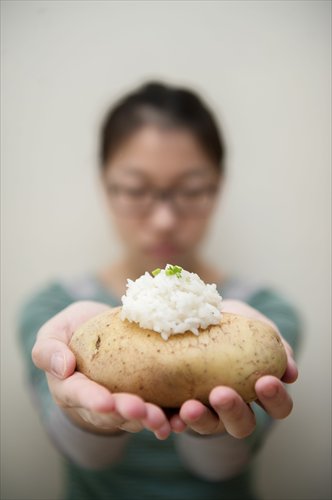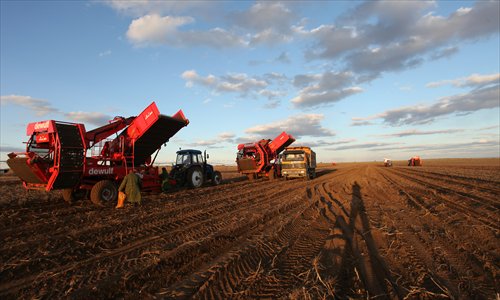The great potato debate
Can the humble spud work its way into the hearts and stomachs of the Chinese people?

In the wake of recent announcements by the Ministry of Agriculture, potato is expected to become the fourth staple food in China, after rice, wheat and corn. Photo: Li Hao/GT
The Ministry of Agriculture (MOA)'s announcement earlier this month that potatoes would become a staple of Chinese people's daily diet has divided public opinion.
Officials said that the plan to nearly double the land used to sow potatoes from 13 million to about 5 million hectares was aimed at ensuring food security and alleviating the burden on the environment, amid irrigation challenges and dwindling arable land. The potato is a more resilient crop than China's traditional staples, requiring less water, and able to be produced at a higher yield.
"Potato can survive in cold, drought and barren environment. It has great potential to be planted in large vacant fields in the south during winter," said Yu Xinrong, vice minister of the MOA, in a press release.
Officials from the ministry also noted the nutritional value of potatoes, calling it an "ideal modern food."
While food and agriculture experts in the country have lauded the government's initiative to embrace potatoes, the decision has raised eyebrows among some Internet users, who have expressed skepticism that Chinese people's traditional preference for rice, wheat and corn can be so easily changed.
The story of the spud
"Most Chinese people have a very limited understanding of the potato as a critical crop," said Chen Yili, professor at the Northeast Agricultural University in Heilongjiang Province and secretary of the Potato Commission of the China Crop Association.
"It is the time for more Chinese people to understand more about potato," said Chen, who is also an organizer of the 2015 World Potato Congress to be held in Beijing's Yanqing county in July.
The potato is indigenous to the Andes region of South America, and was first introduced into China during the Ming Dynasty (1368-1644).
Today most commonly known as tudou, or "earth bean," it has been known by a number of different epithets throughout different eras and areas in the country, including yangyu ("foreign taro"), shanyaodan ("Chinese yam egg") and malingshu.
Although the potato has since become a common ingredient in a number of Chinese dishes, it has never been a staple of the Chinese diet in the same way that rice, wheat and corn have.
In China's more fertile south, rice has long been the staple, while in China's northern regions, wheat-based foodstuffs such as noodles, pancakes and steamed buns have been the essential requisites of every meal.
Except in barren areas afflicted by long periods of draught in China's northwest such as Shaanxi Province, the majority of China's arable land has been dedicated to growing its traditional staples.
Consequently, the potato has in times past been seen as a poorer cousin to China's staple foods, said Chen.
"Eating potato used to be a symbol of poverty, because only those living in remote rural and mountainous regions would eat it as a staple food," said Chen, who explained that the resilience of the tuber was in part due to the fact that it matures underground, unlike grain and wheat crops, which are more vulnerable to cold and arid environments.
Potato crops have been known to even be able to withstand shellbursts during times of war, Chen said.
It is the potato's humble status and ability to flourish in harsh environments that have food experts like Chen singing its praises. The United Nations declared 2008 the International Year of the Potato, to raise awareness of its importance to the goal of eliminating poverty around the world.
"[Governments] around the world are facing challenges to food security due to growing populations," said Chen.
"It would be quite difficult to increase traditional staple crops - rice, wheat, corn - so potatoes can be a replacement."
Meanwhile, the potato's very resilience however has sent some microbloggers into a panic, questioning whether China is facing an imminent food supply crisis.
The charge has been strongly refuted by the MOA, who stressed that the government's plan to increase potato production was part of a broader push to achieve sustainable agricultural development.
"We can responsibly say that China has a sufficient food supply as crop yields have been increasing year on year," said Pan Wenbo, an MOA official, in comments to the People's Daily. "Promoting potatoes as a staple of people's diet is simply a way of ensuring sustainable food security, as well as encouraging people to eat healthier."

Plans have been announced to nearly double the land used for planting potatoes in China. Photo: Courtesy of Beijing Xisen Sanhe Potato Industry Company
Potatoes are better for you
The MOA has stressed the nutritional benefits of eating potatoes. Along with being a source of carbohydrate, potatoes are high in vitamin C, which can help prevent common diseases.
They also contain potassium, vitamin B6 and antioxidants, each of which has been linked to a number of health benefits from lowering blood pressure to maintaining neurological health. Depending on how they are prepared, potatoes by themselves also contain no fat, cholesterol or sodium - all of which have been linked to heart disease.
"People in the northeast [of China] have traditionally stored potato, cabbage and radish to see them through the winter. During times when fruits were hard to purchase on the market, potatoes have been known for being able to provide much of a person's nutritional needs," said Chen.
Gu Zhongyi, a clinical dietitian and author of How We Should Eat (2015), said that the healthiest way of preparing potatoes was by braising or steaming.
Common ways of preparing potatoes in the West, such as frying or baking with butter and salt were far less healthy.
"Potatoes contain very little sugar, so on its own, it's not very tasty," said Gu. "In countries in the West where potatoes are a staple, people try to enhance its flavor by frying or adding a lot of salt."
Besides adding harmful fats and sodium, said Gu, braising was a preferable method of cooking compared to frying because it preserved more of the vitamin C and other minerals that are good for the body. Gu said that eating potatoes could even help people lose weight.
"Compared to refined rice and refined wheat foodstuffs, potatoes contain more vitamin C and less protein," said Gu.
"You will feel more full eating less potato than rice, and the dietary fibers in potatoes can help cleanse the intestines."
Thanks, but no thanks
In the wake of the MOA announcement, some Net users have enthusiastically shared potato-based recipes on their microblogs and social media feeds. But many in the country are not prepared to make potato their staple.
"For me, it is hard to accept eating a lot of potatoes every day," said Xu Tiantian, a woman from Zhejiang Province.
Xu, who has previously studied abroad, said that she didn't change her habit of eating rice as her daily staple during her year in the UK, and wasn't planning to change now.
"Although I like eating potato dishes, such as braised potato with meat, I think it is better as a side dish to be matched with rice," she said.
While China is already the world's largest potato producer, the average person only consumes 37 kilograms of potatoes per year, compared to 56 kilograms in Western countries such as the UK, US, France and Canada, according to a report by Shandong-based newspaper Qilu Evening News in January.
The MOA announced that by 2020, more than half of the national yield for potatoes will be consumed domestically.
Xu Shaoshi, minister of the National Development and Reform Commission, said potatoes would be incorporated into traditionally wheat-based staples like noodles and steamed buns.
Li Yanming, a manager with the Beijing Xisen Sanhe Potato Industry Company in Yanqing county, said that they would be launching a range of new potato-based food products to better suit Chinese consumers' tastes.
"For example, we've developed steamed buns that contain [about 30 percent of] whole potato flour," said Li.
"We also have other products such as noodles, pancakes and walnut cakes made from potato flour."
However, Li said that potato-based products would be a little bit more expensive than their wheaten counterparts.
A bun made from potato flour costs 2 yuan ($0.3), compared to the cost of regular steamed buns, which can be bought for around 0.5 yuan each, said Li.
Given the US Department of Agriculture's recent approval for genetically modified (GM) potato to be commercially planted in the country, others have expressed concerns to making potatoes part of their staple diet on the grounds that they might be eating GM food.
Wang Xiaohu, an official from the MOA, dispelled such fears in recent comments made to the People's Daily, by saying that GM potatoes were neither approved to be planted in China nor imported into the country. "Of the 100 species of potatoes in China at present, none of them are genetically modified," he said.
For those opposed to changing their dietary habits, Gu suggested that people could incorporate potatoes into their staple diets gradually.
"For example, if someone is currently eating [one bowl] of rice per meal as a staple, they could try eating just half a bowl of rice, along with a potato," said Gu.